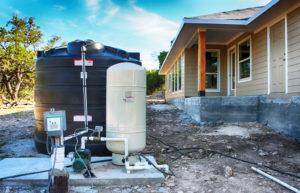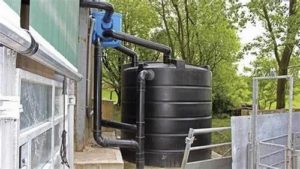Composting toilets offer numerous environmental benefits as part of sustainable waste management practices.
By breaking down organic matter and recycling nutrients, these innovative systems significantly reduce water consumption and carbon footprint compared to traditional sewage infrastructure.
Compost from the system can be utilized as a natural fertilizer for gardens and agriculture, further enhancing the ecological advantages of this cutting-edge technology.
As more people turn to sustainable living practices, exploring alternatives like composting toilets is an important step towards creating greener communities that contribute positively back into our environment.
So, keep reading if you’re looking for actionable tips on how incorporate these eco-friendly solutions successfully – we have some practical recommendations below!
Reduces Water Consumption
Composting toilets use significantly less water compared to traditional toilets, which can help conserve this precious resource, particularly in areas where water is scarce.
Unlike traditional toilets that rely heavily on water for flushing, composting toilets use a minimal amount of water or even non-potable water sources, such as greywater or rainwater.
By using composting technology, these toilets break down human waste into a nutrient-rich compost that can be safely used as fertilizer in gardens and agriculture, thereby closing the loop on waste management and reducing the demand on potable water supplies.
This conservation of water not only benefits the environment but also helps reduce the financial burden of water usage, making composting toilets an attractive option for those looking to reduce their water footprint.
Composting toilets can be especially beneficial in remote or off-grid locations where access to potable water is limited, providing an independent and sustainable solution for sanitation.
Minimizes Waste
By composting human waste, these toilets convert it into a valuable soil amendment, reducing the amount of waste that goes to landfills. This approach helps to minimize the environmental impact of waste disposal and promotes sustainable waste management practices.
By composting human waste, these toilets revolutionize the way we manage waste disposal, transforming a previously overlooked and wasteful practice into a valuable resource.
This innovative approach not only reduces the amount of waste that ends up in landfills, but it also provides a natural and sustainable solution for fertilizing plants and improving soil health.
The composted human waste, now a nutrient-rich soil amendment, helps to promote healthy plant growth, reduce the need for synthetic fertilizers, and improve the overall health of our ecosystems.
This shift towards sustainable waste management practices not only benefits the environment but also provides a cost-effective and reliable solution for communities around the world.
With this cutting-edge technology, we can finally begin to tackle the pressing issue of waste disposal in a responsible and sustainable manner.
Efficient Nutrient Recycling
Composting toilets recycle human waste, turning it into a nutrient-rich soil amendment for gardens, parks, and other landscaping projects. This efficient nutrient recycling reduces the need for synthetic fertilizers and promotes healthier soil and plant growth.
Composting toilets are an innovative solution for sustainable waste management, providing a convenient and eco-friendly alternative to traditional sewage systems.
By recycling human waste, these toilets turn waste into a valuable resource, producing a nutrient-rich soil amendment that can be used in gardens, parks, and other landscaping projects.
This efficient nutrient recycling not only reduces the need for synthetic fertilizers but also promotes healthier soil and plant growth.
The composting process involved in these toilets is a carefully managed decomposition of organic matter, which produces a rich and nutrient-dense compost.
This compost can then be used to improve soil structure, increase water retention, and provide essential nutrients for plants.
In addition, the use of composting toilets reduces the amount of waste sent to landfills, helping to mitigate greenhouse gas emissions and minimize the environmental impact of waste disposal.
Furthermore, composting toilets can be designed to be self-sustaining, using minimal water and energy inputs.
These toilets are often equipped with features such as low-water fixtures, rainwater harvesting systems, and solar-powered electricity generation.
By leveraging these innovative technologies, composting toilets can provide a reliable and self-sufficient solution for sustainable waste management.
Overall, composting toilets offer a powerful combination of environmental benefits, cost savings, and improved public health.
By recycling human waste into a valuable resource, these toilets provide a sustainable solution for waste management that can be easily integrated into existing infrastructure.
Reduces Greenhouse Gas Emissions
Composting toilets can reduce greenhouse gas emissions by avoiding the production and use of fossil fuels for waste management. By composting waste on-site, these toilets eliminate the need for long-distance transportation and storage of waste.
Composting toilets offer a highly effective solution for reducing greenhouse gas emissions in the waste management sector.
By avoiding the production and use of fossil fuels, these toilets minimize the carbon footprint associated with the transportation and storage of waste.
The composting process takes place on-site, thereby eliminating the need for long-distance transportation and storage, which can significantly reduce emissions.
Furthermore, composting toilets produce a valuable byproduct in the form of nutrient-rich compost, which can be used to improve soil health and promote sustainable agriculture.
In addition, by reducing the amount of waste that is sent to landfills, composting toilets help to extend the life of landfills and reduce the need for new landfill construction.
This not only saves resources but also helps to preserve natural habitats and ecosystems.
Composting toilets offer a critical tool for reducing greenhouse gas emissions and promoting sustainable waste management practices.
Low Energy Requirements
Composting toilets typically require low levels of energy to operate, unlike traditional toilets that consume significant amounts of electricity and water. This makes composting toilets an energy-efficient solution for sustainable waste management.
Composting toilets are a sustainable and energy-efficient solution for waste management, as they typically require very low levels of energy to operate.
Unlike traditional toilets that consume significant amounts of electricity and water, composting toilets use a natural process to decompose human waste, resulting in a net-zero water and energy footprint.
This makes them an ideal choice for remote or off-grid locations where access to water and electricity is limited.
The composting process reduces the volume of waste by up to 90%, which can be a significant advantage for communities with limited landfill space.
Overall, composting toilets offer a cost-effective and environmentally friendly solution for managing human waste, and can help reduce our reliance on precious water and energy resources.
Improves Soil Health
The composted waste from composting toilets can improve soil health by increasing its organic matter content, improving its structure, and providing essential nutrients for plants. This can lead to healthier crops, stronger trees, and reduced soil erosion.
Composted waste from composting toilets is a valuable resource for improving soil health and fertility.
The organic matter content of the compost, which includes carbon-rich materials like sawdust and coconut coir, helps to increase the soil’s organic matter content, improving its structure and fertility.
This, in turn, supports healthy root development, improved water retention, and reduced soil erosion.
The nutrients and microorganisms present in the compost also provide essential minerals and vitamins for plants, promoting healthy growth and development.
By using composted waste from composting toilets, farmers and gardeners can improve soil health, increase crop yields, and reduce their reliance on synthetic fertilizers and soil amendments.
This not only supports more sustainable and resilient agriculture but also contributes to a closed-loop system where waste is transformed into a valuable resource.
Enhances Biodiversity
Composting toilets can contribute to enhanced biodiversity by creating habitats for beneficial microorganisms, insects, and small animals. These beneficial organisms can pollinate plants, control pests, and improve ecosystem services.
Composting toilets not only provide an innovative solution for sustainable sanitation, but they also offer a unique opportunity to enhance local biodiversity.
By creating a habitat for beneficial microorganisms, insects, and small animals, these systems promote a diverse array of life-sustaining processes.
Pollination, pest control, and ecosystem services are all bolstered by the presence of these beneficial organisms.
For instance, bees and butterflies are attracted to the composting toilets, which provides a source of nectar and pollen.
These pollinators, in turn, contribute to the fertility of the surrounding environment by pollinating plants and facilitating the reproduction of vegetation.
Ladybugs and lacewings, which are attracted to the composting toilets, prey on pests that can harm crops and plants.
By harboring these beneficial insects, the composting toilets provide an ecological service that supports the well-being of the surrounding ecosystem.
Furthermore, the nutrient-rich compost produced by the toilets can be used as a natural fertilizer, which promotes the growth of a diversity of plants and enhances the overall biodiversity of the area.
Overall, the installation of composting toilets can have a profound impact on the local biodiversity, leading to a more resilient and thriving ecosystem.
Reduced Water Use
Composting toilets typically require significantly less water than traditional toilets, as they use a wet composting process that does not rely on potable water for flushing. This reduction in water use can contribute to a more sustainable and water-efficient community.
Composting toilets are an innovative solution that can significantly reduce water consumption in households and communities.
Unlike traditional toilets that rely on potable water for flushing, composting toilets use a wet composting process that is self-sufficient and does not require any potable water.
This not only conserves water but also reduces the amount of wastewater that needs to be treated and discharged into the environment.
By using composting toilets, communities can not only save water but also reduce the strain on their sewage systems, which can be costly to build and maintain.
The composted waste can be used as a nutrient-rich fertilizer for gardens and crops, further closing the loop of sustainability.
Overall, switching to composting toilets can make a significant contribution to a more sustainable and water-efficient community.
Want More? Dive Deeper Here!
Hey there! If you’re the type who loves going down the rabbit hole of information (like we do), you’re in the right spot. We’ve pulled together some cool reads and resources that dive a bit deeper into the stuff we chat about on our site. Whether you’re just killing time or super into the topic, these picks might just be what you’re looking for. Happy reading!






